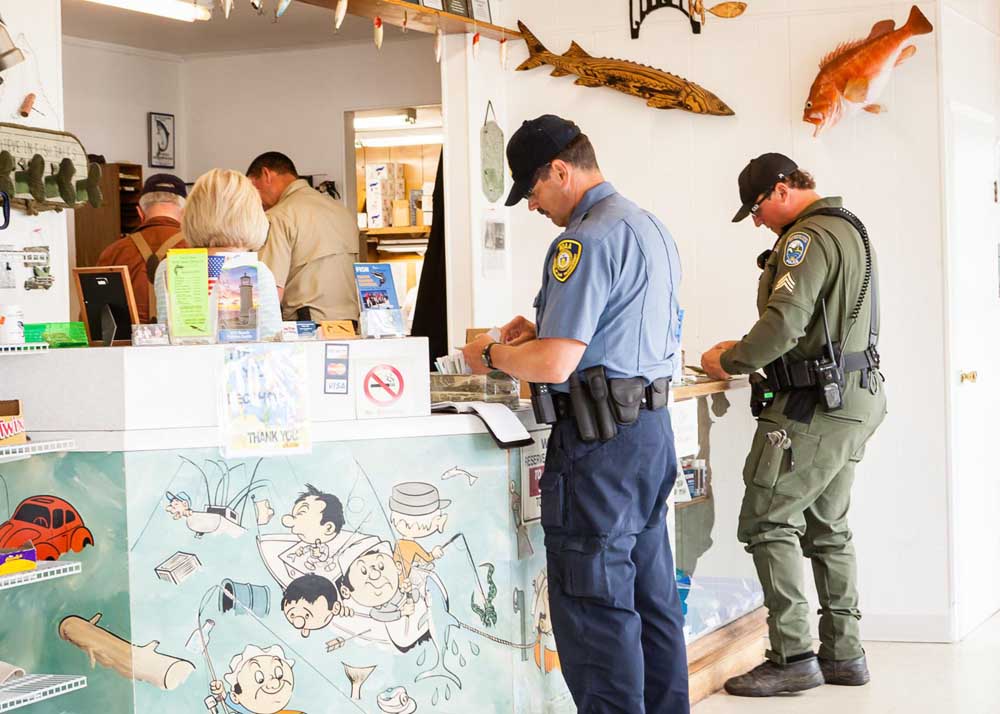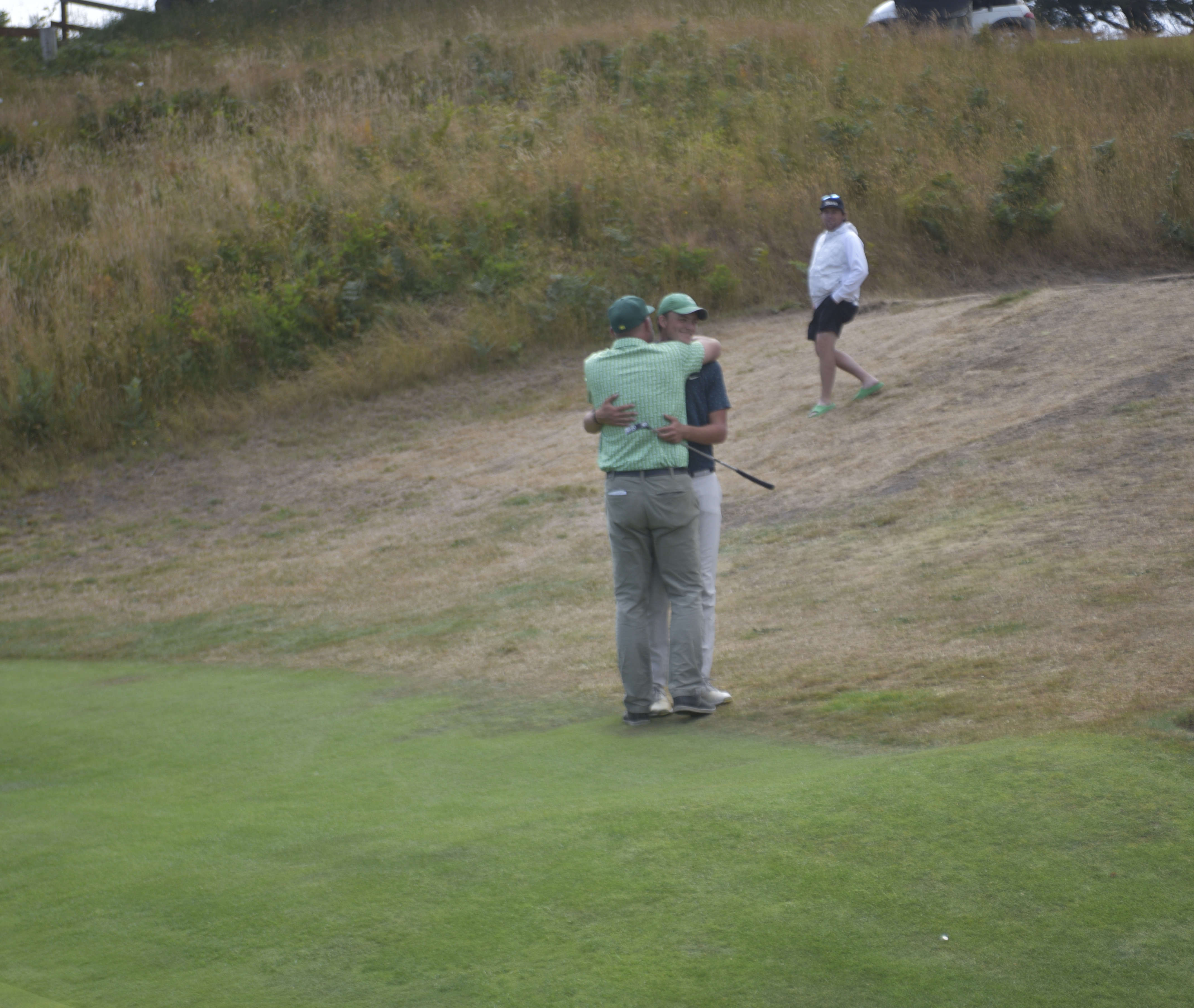Jury will decide if local charter overfished
Published 2:12 pm Tuesday, February 26, 2019

- National Oceanic and Atmospheric Administration Lt. Greg Bush and Washington Department of Fish and Wildlife Sgt. Tony Leonetti reviewed records at Pacific Salmon Charters in the Port of Ilwaco last year.
LONG BEACH, Wash. — What do two military men from Idaho, a soda salesman from the Tri-Cities, a retired South African, a game warden and a local nursing student have in common? They all testified during the first week of fishermen Robert and David Gudgell’s lengthy poaching trial.
Trending
In all, the brothers, who operate Pacific Salmon Charters, stand accused of more than two dozen counts of second-degree unlawful recreational fishing, a misdemeanor, and waste of fish and wildlife, a gross misdemeanor. With a long list of potential witnesses, attorneys estimate the trial will continue at least through today.
The charges, filed last spring, stem from a monthslong investigation of alleged halibut “high-grading” aboard boats in the Pacific Salmon fleet. The investigation led to almost 40 charges for six men. In June 2017, an undercover Washington Department of Fish and Wildlife enforcement officer booked a halibut-fishing trip with Pacific Salmon after getting a tip from a customer who said he witnessed so-called “high-grading” during his trip.
Afterward, the officer said he saw crewmembers encourage passengers to catch more than the strict one-halibut-per-person limit. He also said crewmembers culled the largest fish and threw smaller fish back into the ocean. Some of the rejected fish were allegedly stored in unsatisfactory conditions, and some allegedly died or were killed before they were dumped. Under Washington law, halibut fishermen can catch one fish. They must keep the first fish they catch.
Trending
Focus on Gudgell brothers
Neither of the Gudgell brothers was on the boat where the undercover sting took place. The Department of Fish and Wildlife subsequently served a warrant on the charter company and spent months seeking statements and conducting interviews with other Pacific Salmon customers. The state’s case against the brothers is based on witness statements and other evidence gathered during the follow-up investigation. Several Pacific Salmon employees were charged in separate cases that will be resolved after the Gudgell trial.
The brothers’ defense attorney, Nathan Needham, asked South District Court Judge Nancy McAllister to strictly limit discussion of the sting, saying alleged activity on another boat had no bearing on the Gudgells’ case, and would bias the jury against them. McAllister agreed.
Last week, Pacific County Deputy Prosecutor Joe Faurholt called numerous witnesses, mostly former Pacific Salmon customers. They included Kenneth and Gary Collenborne, brothers from Idaho who both had long military careers. Ken Collenborne, a lifelong outdoorsman, said he and his relatives contacted the Department of Fish and Wildlife after witnessing what appeared to be wasteful, possibly illegal fishing practices aboard the West Wind. Both men testified that a deckhand urged them to keep fishing after they caught their limit. Later, they allegedly saw the crew move fish tags to the largest specimens, then throw the smaller fish overboard.
“None of them appeared alive to me and there were a few with their throats cut,” Ken Collenborne said. “I was glad I caught a halibut, but it bothered me that fish had been wasted.”
Several witnesses said they were surprised to be told to catch more fish, but assumed the crew understood the rules better than they did.
“They told everybody the same: ‘Pick your biggest one. Pick the biggest fish.’ Everybody did it,” said Alvaro Torres, a young Tri-Cities truck driver and soda salesman who took his father fishing for Father’s Day. According to Torres, the crew dumped the unwanted fish shortly before returning to Ilwaco.
“I was like, ‘That’s a waste,’ but I didn’t know if you could do that or not,” Torres recalled. “You could see them spinning in the ocean. They were dead.”
Longview resident John Gerrard went fishing on a day when the water was so rough that his Midwestern relative was afraid they would die. Gerrard spent much of the trip comforting the landlubbing relation, but remembered being told, “We’re gonna go another round and if we catch anything bigger, we can get rid of the smaller ones.” The ones they ended up keeping weren’t significantly larger than the first fish they caught, he said.
Death in the livewell
“I think we caught about three apiece, me and my buddy,” said Kelly Smith, a retired welder from Kennewick.
Heinrich Luyt, a South African immigrant who now lives in Longview, said he booked the trip so he could learn the rules and techniques of halibut fishing from experts. He said he was surprised when the crew packed a so-called “livewell” so full the lid wouldn’t close.
“There were so many I don’t think the gills were opening and closing anymore. It was like having someone stepping on your chest,” Luyt said. He, too, testified the crew overfished.
“The 12 or 13 we were gonna keep went back into the box. The other fish that were already sized out got slid under the railing over the side back into the water and they just floated down like a leaf.”
Prosecutors called former deckhand Kendra Koskiniemi, who worked for the Gudgells while saving money for school. As she testified, Koskiniemi faced her former bosses, who sat a few feet away at the defendant’s table.
Koskiniemi said she didn’t recall any specifics, but acknowledged it was possible she’d thrown fish back while working for David Gudgell. She was among the crewmembers Department of Fish and Wildlife Officer Todd Dielman interviewed on the day of the undercover operation. According to police statements, she allegedly gave evasive answers at first, but decided to cooperate after realizing charges against her could potentially affect her career prospects.
Koskiniemi said she remembered very little of her conversations with investigators after the trip.
“I was very upset and didn’t know what was going on, and just very scared for my future as a nursing student,” she said.
Needham, the defense attorney, zeroed in on the implication that fear influenced her decision to talk with Dielman.
“I bet this was probably the last thing you expected from an officer — for them to come in and say they were going to take everything from you,” Needham said. Faurholt said Needham had mischaracterized the encounter.
The trial will likely go to jury on Thursday or Friday. Before they go into deliberation, the jury will be given a set of rules, provided by the attorneys and approved by the judge, that will help them decide whether the Gudgells clearly violated the law.









